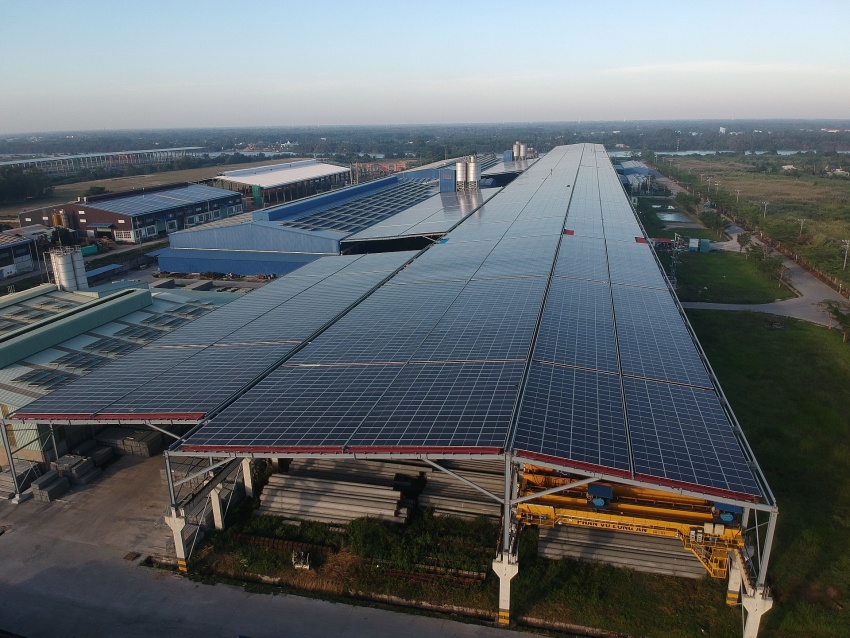Green finance for a sustainable future
 |
| Solar panels at PVI Long An |
Consumers in the ASEAN region are recognising the impact that climate change may have on their children’s well-being and are changing their purchasing behaviour to play their part.
According to the UOB ASEAN Consumer Sentiment Study 2021, 58 per cent of respondents in the region are motivated to spend more on a sustainable product as they believe it will contribute to a better future for their children. In Vietnam, consumers are even more conscious, with 67 per cent sharing the same view – 14 per cent more than in 2020.
91 per cent of respondents said they want more sustainable investment and financing options. In Vietnam, it is a similar picture, with 87 per cent agreeing that sustainable investing will become more common in the next 3-5 years. Consumers are recognising that their everyday choices, from where they live and how they commute, to which merchants they use and what they invest in, make a difference for the environment.
Along with this change in consumer attitudes and behaviour, banks are stepping up to play their part in the transition to a more sustainable future. More financial institutions are offering green products and services in Vietnam, with UOB being among the pioneers in this field.
In November 2021, UOB Vietnam worked with the Phu My Hung Development Corporation to provide homeowners with an option to take up a green mortgage loan if they purchase a unit at Cardinal Court – one of Vietnam’s newly-built green buildings.
The development obtained the Excellence in Design for Greater Efficiencies green building certification in March 2021. Its construction materials, sanitary equipment, and electricity and water systems all comply with stringent eco-friendliness criteria.
In the same month, the bank also rolled out a preferential car loan package for customers who are purchasing electric or hybrid cars. The adoption of electric vehicles and green properties reflects the increasing awareness of the need to go green and the local population is more inclined to support institutions that provide sustainable financing or investing.
Helping businesses advance responsibly
Beyond meeting the expectations of consumers, green practices also help businesses to thrive beyond the immediate profit cycle. More than 80 per cent feel that companies which embrace sustainable practices are more likely to have business longevity and deliver long-term value to stakeholders, employees, and the community.
Banks are a valued partner of businesses in this regard. In early 2021, UOB Vietnam provided green loan facilities under the UOB Smart City Sustainable Finance Framework to ATAD and Phan Vu Investment (PVI).
ATAD is a leading steel structure company in Southeast Asia, while PVI is a contractor that supplies concrete piles. Both companies used the loans to build photovoltaic (PV) solar systems on their office rooftops.
With UOB’s support, the two companies’ rooftop solar panels will generate over 18,600 megawatt hours of electricity every year. This translates to the removal of 8,420 metric tonnes of greenhouse gases or 1,800 cars taken off the road annually. ATAD and PVI will also be able to sell any excess electricity generated by their solar panels to Vietnam of Electricity’s grid and use the revenue to offset their electricity costs.
Green finance in Vietnam continues to expand
At the United Nations Climate Change Conference that took place last year, Vietnam pledged to reach net-zero carbon emissions by 2050 and to phase out coal-fuelled power generation in the 2040s or sooner.
The Ministry of Industry and Trade has developed an action plan which will focus on controlling greenhouse gas emissions, converting coal power to clean energy, and encouraging the development of electric cars.
As banks walk alongside the region’s governments on this green journey, research by Bain and Company estimates that Southeast Asia’s green economy could offer up to $1 trillion in annual opportunities by 2030.
Financial institutions will play a vital role in the provision of capital to finance the investment in renewables, climate adaptation technologies, and the transition to a circular economy. By ensuring that finance is tied to sustainable outcomes, banks help businesses advance responsibly and move towards a greener future.
What the stars mean:
★ Poor ★ ★ Promising ★★★ Good ★★★★ Very good ★★★★★ Exceptional
 Tag:
Tag:
Related Contents
Latest News
More News
- $100 million initiative launched to protect forests and boost rural incomes (January 30, 2026 | 15:18)
- Trung Nam-Sideros River consortium wins bid for LNG venture (January 30, 2026 | 11:16)
- Vietnam moves towards market-based fuel management with E10 rollout (January 30, 2026 | 11:10)
- Envision Energy, REE Group partner on 128MW wind projects (January 30, 2026 | 10:58)
- Vingroup consults on carbon credits for electric vehicle charging network (January 28, 2026 | 11:04)
- Bac Ai Pumped Storage Hydropower Plant to enter peak construction phase (January 27, 2026 | 08:00)
- ASEAN could scale up sustainable aviation fuel by 2050 (January 24, 2026 | 10:19)
- 64,000 hectares of sea allocated for offshore wind surveys (January 22, 2026 | 20:23)
- EVN secures financing for Quang Trach II LNG power plant (January 17, 2026 | 15:55)
- PC1 teams up with DENZAI on regional wind projects (January 16, 2026 | 21:18)


























 Mobile Version
Mobile Version